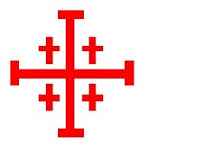abcdefghijklmonpqrstuvwxyz
There are a number of
wingding theologies out in the ether; glory dust, holy laughter, the superstitious
use of blessed salt, and other marginal teachings based, not on Scripture but
on experience, and on fervent desire. One
of the more pleasant manifestations was the sudden pervasive scent of roses
stealing upon the gathered faithful. In
visiting one church I was surprised by animal noises ostensibly given by the
Holy Spirit. Either barking in the
Spirit, or barking mad! Frankly, some of
it is just good fun, but the danger is that people will seek the manifestations
rather than seek the Lord Himself. The
underlying problem is a lack of familiarity with systematic theology and
tradition. That deficiency leads to a
misuse of biblical texts to support all kinds of strange innovations.
Experience is not the
proper basis for the formation of Christian doctrine. Doctrine should be formulated on God’s
self-revelation in Holy Scripture, and in the Person of our Lord Jesus
Christ. Doctrine should be also
formulated not only with both feet planted firmly on Holy Scripture, but with
one eye on the centuries of tradition within the Church. Years ago, Dennis Bennett, a Charismatic
leader in the late 20th Century observed that, “The Charismatic
Movement is recreating all the ancient heresies as though Church History never existed.” A simple way for the average Anglican to
check the authenticity and safety of any of these manifestations is to ask two
questions. 1. Is it biblical? 2. Does it square with The
Book of Common Prayer.
Of course the same
standard should be applied to any of the innovations from the more liberal side
of the Church. Applying to a special
revelation of the Holy Spirit justifying homosexual behavior, as Gene Robinson
did at one point, is not a basis for developing a theological view of human
sexuality. Just because so-and-so is
doing something claiming that they have the Holy Spirit, doesn’t make it right. The first response is this, “Show it to me in
the Bible.” One current problem with this
is that some theologians are not above justifying sexual gymnastics with
textual gymnastics. As for the second
check point, that of The Book of Common Prayer, there is the persistent
movement to change The Book of Common Prayer by adding additional services to ‘sanctify’
their position, making what amounts to A Loose Leaf Book of Common Prayer.


No comments:
Post a Comment